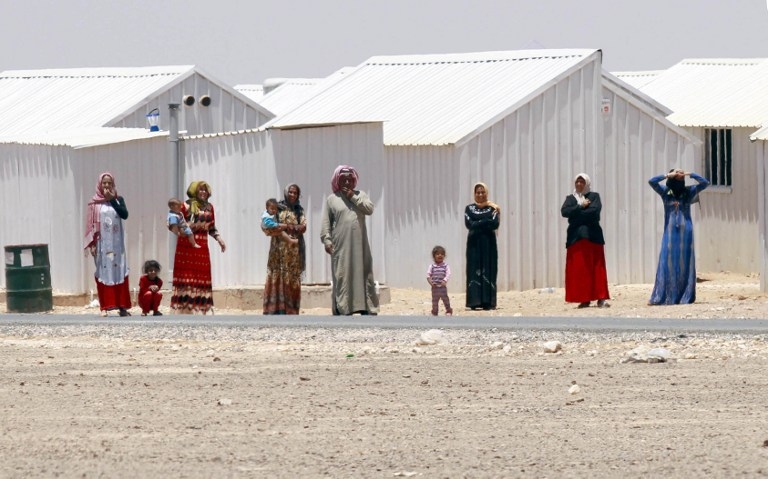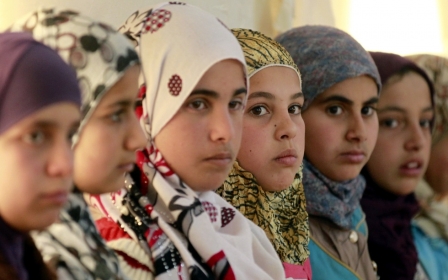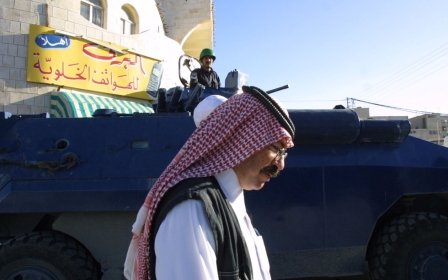In Jordan, all refugees are not equal

With a seething civil war to the north, Islamic State marauders to the east, a severe water shortage and a worryingly high unemployment rate, Jordan is struggling to keep its own house in order while offering safe haven to more than 600,000 Syrian refugees – and with more arriving daily.
Often referred to by politicians as “our Syrian brothers,” the people who flee violence in Syria live in camps and in communities across the country, where they routinely access Jordanian healthcare, schools and infrastructure. International and local humanitarian agencies also shoulder the burden with programmes, goods and services, designed to ensure that no one falls through the cracks.
But a new report by Human Rights Watch (HRW) shows that a huge group is falling through the cracks: Palestinians. Not Welcome: Jordan’s Treatment of Palestinians Escaping Syria alleges that Jordan is shirking its international obligations by refusing entry to and even deporting refugee Syrians of Palestinian origin.
The report also highlights a handful of cases where Jordanian citizens of Palestinian origin residing in Syria have had their Jordanian nationality revoked - leaving them stateless. In several cases, HRW research indicates that this process of denationalisation was initiated after these people fled Syria for their home country of Jordan.
Adam Coogle, a Middle East researcher for Human Rights Watch, says the seven cases his team has uncovered are likely just the tip of the iceberg.
“Our sample size is small but through conversations with other monitors and people who are looking at this issue, we can say that the actual problem is much larger than the amount of cases we have documented, that’s for sure,” said Coogle.
But the size of Jordan’s Syrian-Palestinian problem is not small: an estimated 14,000 Syrians of Palestinian origin are currently living in Jordan. Some may have come in on false documents and others may have had no documents at all. People tend to be “caught,” so to speak, when they are obtaining services.
“Typically, people go to renew documentation or obtain new documents, to register a birth, say, and they are told they need to go deal with their citizenship,” Coogle explained.
“Then they show up for the meeting and they are deported back to Syria.”
Families who try to avoid this scenario risk becoming more vulnerable by staying off the radar: when they don’t register new births, for example, families may be unable to access medical services for those children.
Humanitarian protection for some Syrians – but not all
In January 2013, Prime Minister Abdullah Ensour announced the country’s non-admission policy for Syrian refugees of Palestinian origin: “Jordan has made a clear and explicit sovereign decision to not allow the crossing into Jordan by our Palestinian brothers who hold Syrian documents.”
The policy was framed in historical terms, with Ensour commenting that “Jordan is not a place to solve Israel’s problems,” and suggesting Palestinians would be better to return to their places of origin in Israel and Palestine
Under the non-admission policy, Syrian refugees with documentation that shows they are Palestinian, or those suspected of being Palestinian – either because they lack documentation or because their papers are suspected of being false – are refused entry into Jordan.
The report features the story of Abdullah, a 47-year-old Palestinian from Damascus, who paid smugglers to take him across the border into Jordan. Abdullah’s group was caught by Jordanian border guards who shot at the refugees and after apprehending them, shot each in the leg at close range.
Interviewed by Middle East Eye whilst recovering in Jordan, Abdullah was blunt about what will happen after his leg heals: “I’m Palestinian. I’m not allowed to stay in Jordan.”
“Our sovereign right as a country”
HRW research suggests that this is just the beginning of Jordan’s double-standard for Syrian refugees. In cases where Palestinians – or those suspected of being Palestinian - who have made it into the country are identified, the report alleges they are “refouled” - legalese for being deported.
Middle East Eye spoke with one exhausted mother who was refouled on the grounds of being Palestinian – despite insisting to this day that she is isn’t.
Um Firas, a young mother from Ghouta, near Damascus, paid a smuggler to transport herself and her young children along regime-held roads south to the desert crossing point where UNHCR and the Jordanian border forces receive refugees. They crossed into Jordan and had made it to Raba’a al-Sarhan, the town where UNHCR registers refugees, when Umm Firas says Jordanian officials challenged her claim that she was Syrian. Her family booklet, the only identification she had, was not enough to convince them.
“I told them many times that I am the daughter of a martyr from the Tishreen War [the 1973 Arab-Israeli war),” said Umm Firas. “I was told, how do we know you are a Syrian or Palestinian? I said, ‘Wallah, I am a Syrian and a descendant of a Syrian.’”
Yet her protests fell on deaf ears, and she, her children and her family booklet were sent back to Syria. Out of money and hope, they made their way to a camp for internally displaced people in Dera’a, which has become a sort of purgatory for those who have fled violence in their home towns and villages, but lack the means, documents or luck to restart their lives in Jordan.
The HRW report emphasises that the principle of non-refoulement is a crucial part of refugee law. Given this, the accusation that Jordan is repatriating vulnerable people to the country they have fled is damning, especially given the Kingdom’s much-admired efforts to host refugees and stretch its limited resources almost impossibly far.
Mohammad al-Momani, Jordan’s Minister of Media Affairs and Communications, spoke with Middle East Eye, and accused HRW’s findings of being “unfair” to these efforts. “Refugees entering Jordan are treated equally and we cannot allow those who do not have documents or have forged documents to stay or enter regardless of their origin,” he said. “This is our sovereign right as a country.”
While the country’s position is clear, for Jordanians themselves - especially Jordanians of Palestinian origin, who account for half the country’s population and fill high offices, run businesses and are a vital part of Jordan’s identity - the matter is more nuanced.
A half-dozen Jordanian-Palestinians approached about the matter said they found the suggestion that some Palestinians are more equal than others deeply troubling. Current events especially shed critical light these policies: if those Palestinians in Gaza are worthy of Jordan’s aid, money and even the King’s blood, why not those Palestinians who live in Syria and wish to escape that war, too?
New MEE newsletter: Jerusalem Dispatch
Sign up to get the latest insights and analysis on Israel-Palestine, alongside Turkey Unpacked and other MEE newsletters
Middle East Eye delivers independent and unrivalled coverage and analysis of the Middle East, North Africa and beyond. To learn more about republishing this content and the associated fees, please fill out this form. More about MEE can be found here.



